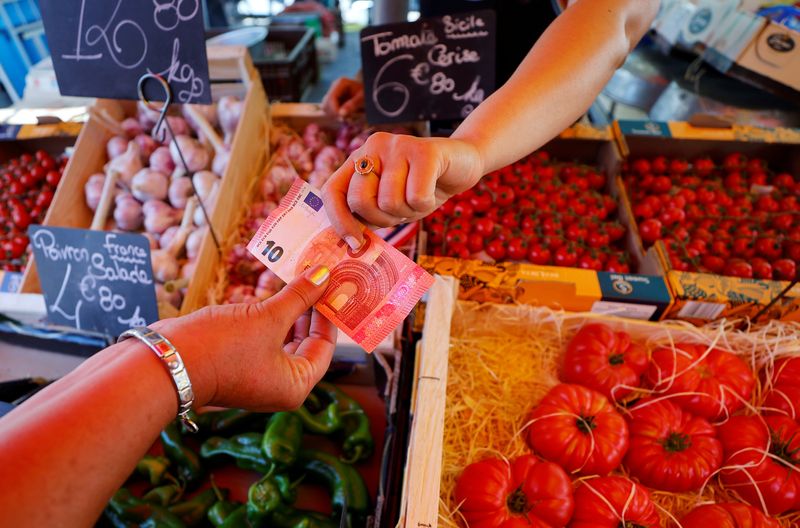FRANKFURT (Reuters) -Euro zone inflation eased for the third straight month in January but any relief for the European Central Bank may be limited as underlying price growth held steady and concerns have already been raised about the reliability of the figures.
Inflation across the 20 countries that use the euro fell to 8.5% last month from 9.2% in December, driven by a fall in energy costs even as food and industrial goods kept upward pressure on prices, Eurostat data showed on Wednesday.
That figure was well below the 9% predicted by a Reuters poll of economists.
Price growth has been in rapid decline since peaking at a record 10.6% in October but the ECB has already promised more interest rate hikes, fearing that without higher borrowing costs inflation could become entrenched above its 2% target.
ECB policymakers meeting on Thursday are almost certain to raise rates by a half a percentage point to 2.5%, and the biggest question is how much more tightening it will signal.
The drop in headline inflation is unlikely to expunge concerns among conservative policymakers that rapid price growth is becoming entrenched, a worry reinforced by high underlying inflation on Wednesday.
Inflation excluding volatile food and fuel prices picked up to 7% from 6.9% while an even narrower measure watched closely by the ECB held steady at 5.2%, exceeding forecasts for 5.1%.
Underlying inflation was driven by a jump in processed food and industrial goods prices but services inflation, a key worry because it reflects wage growth, eased a touch.
"As the ECB's attention is gradually turning away from the main measure and onto core inflation, we think that falls in headline inflation will do little to stem the central bank’s hawkishness," said Mateusz Urban at Oxford Economics.
"We therefore think that ECB is going to hike interest rates by 50bps this month and next, with a risk of another 25bps hike in May if inflationary pressures fail to moderate as we expect."
DATA DOUBT
Another issue is the reliability of the data. Unlike in other months, data from Germany, the bloc's biggest economy, is missing and Eurostat was forced to use a model-based estimate.
"Let's not get carried away by a number that is missing a third of the information. For all practical purposes, the January inflation print is delayed," Nordea said in a note.
January figures are also prone to unusual volatility because of start-of-the-year price changes, economists say.
Hawkish policymakers are likely to argue that a milder-than-expected economic downturn will mean a smaller increase in unemployment, so that wages will remain under upward pressure and force the ECB to raise rates even more.
Euro zone unemployment held steady at 6.6% in December, its lowest rate on record, separate data showed on Wednesday.
ECB hawks are also likely to say that core inflation is at risk of getting stuck well above the ECB's 2% target as the second-round effects of high energy prices feed through, potentially leading to a spiral.
Markets now expect ECB rates to peak at 3.5%, the highest rate in over 20 years, suggesting another 100 basis points of hikes after Thursday's move.
Policy doves from the bloc's south are likely to fight back, however, arguing that the economy has already started to respond and more time is needed for past policy moves to take effect.
They will point to figures this week showing bank lending is set for its biggest drop since the bloc's 2011 debt crisis and negative growth last quarter in big euro zone economies Germany and Italy.

Unexpectedly positive - though meagre - euro zone growth in the final months of 2022 may have been due largely to the exceptionally mild winter weather, which kept a lid on energy costs for businesses and households, and strong Irish data.
Falls in market-based natural gas prices - now below their levels from before Russia invaded Ukraine nearly a year ago - and oil prices, also down from last summer's highs, should further ease price pressures.